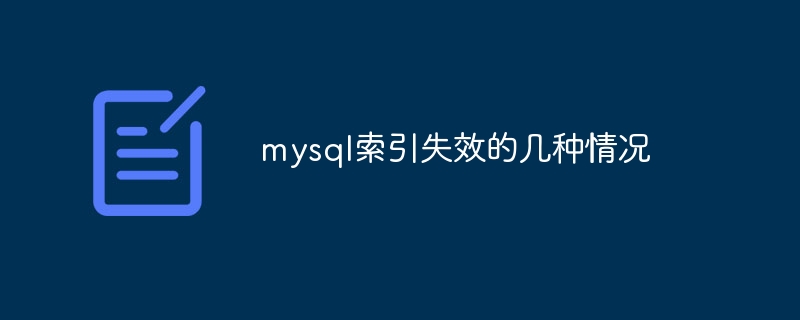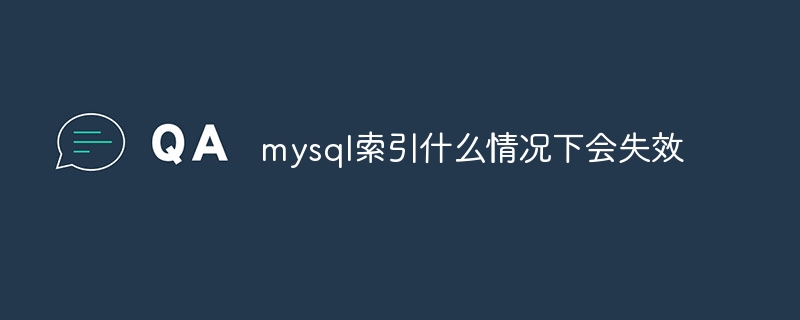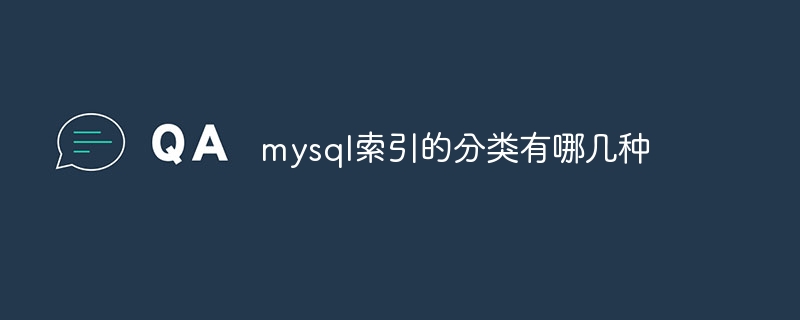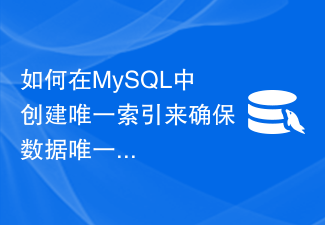This article mainly introduces to you what is a MySQL index?
The establishment of MySQL index is very important for the efficient operation of MySQL. The index can greatly improve the retrieval speed of MySQL.
For example, if MySQL that is properly designed and uses indexes is a Lamborghini, then MySQL that is not designed and uses indexes is a human tricycle.
Indexes are divided into single column indexes and combined indexes. A single-column index means that an index only contains a single column. A table can have multiple single-column indexes, but this is not a combined index. Combined index, that is, an index contains multiple columns.
When creating an index, you need to ensure that the index is a condition applied to the SQL query statement (usually as a condition of the WHERE clause). [For specific operation methods, you can refer to MySQL Video Tutorial or MySQL Manual on the PHP Chinese website! 】
In fact, the index is also a table, which saves the primary key and index fields and points to the records of the entity table.
The above all talk about the benefits of using indexes, but excessive use of indexes will cause abuse. Therefore, the index will also have its shortcomings: although the index greatly improves the query speed, it will also reduce the speed of updating the table, such as INSERT, UPDATE and DELETE on the table. Because when updating the table, MySQL not only needs to save the data, but also save the index file.
Creating index files will occupy disk space.
The above is the detailed content of What is a MySQL index? 【Detailed explanation】. For more information, please follow other related articles on the PHP Chinese website!
 mysql索引失效的几种情况Feb 21, 2024 pm 04:23 PM
mysql索引失效的几种情况Feb 21, 2024 pm 04:23 PM常见情况:1、使用函数或运算;2、隐式类型转换;3、使用不等于(!=或<>);4、使用LIKE操作符,并以通配符开头;5、OR条件;6、NULL值;7、索引选择性低;8、复合索引的最左前缀原则;9、优化器决策;10、FORCE INDEX和IGNORE INDEX。
 mysql索引什么情况下会失效Aug 09, 2023 pm 03:38 PM
mysql索引什么情况下会失效Aug 09, 2023 pm 03:38 PMmysql索引在不使用索引列进行查询、数据类型不匹配、前缀索引的使用不当、使用函数或表达式进行查询、索引列的顺序不正确、数据更新频繁和索引过多或过少情况下会失效。1、不使用索引列进行查询,为了避免这种情况,应该在查询中使用适当的索引列;2、数据类型不匹配,在设计表结构时,应该确保索引列和查询的数据类型匹配;3、前缀索引的使用不当,可使用前缀索引。
 MySQL索引左前缀匹配规则Feb 24, 2024 am 10:42 AM
MySQL索引左前缀匹配规则Feb 24, 2024 am 10:42 AMMySQL索引最左原则原理及代码示例在MySQL中,索引是提高查询效率的重要手段之一。其中,索引最左原则是我们在使用索引优化查询的过程中需要遵循的一个重要原则。本文将围绕MySQL索引最左原则的原理进行介绍,并给出一些具体的代码示例。一、索引最左原则的原理索引最左原则是指在一个索引中,如果查询条件是由多个列组成的,那么只有按照索引中的最左侧列进行查询,才能充
 mysql索引的分类有哪几种Apr 22, 2024 pm 07:12 PM
mysql索引的分类有哪几种Apr 22, 2024 pm 07:12 PMMySQL 索引分为以下类型:1. 普通索引:匹配值、范围或前缀;2. 唯一索引:确保值唯一;3. 主键索引:主键列的唯一索引;4. 外键索引:指向另一表主键;5. 全文索引:全文搜索;6. 哈希索引:相等匹配搜索;7. 空间索引:地理空间搜索;8. 复合索引:基于多个列的搜索。
 PHP与MySQL索引的数据更新和索引维护的性能优化策略及其对性能的影响Oct 15, 2023 pm 12:15 PM
PHP与MySQL索引的数据更新和索引维护的性能优化策略及其对性能的影响Oct 15, 2023 pm 12:15 PMPHP与MySQL索引的数据更新和索引维护的性能优化策略及其对性能的影响摘要:在PHP与MySQL的开发中,索引是优化数据库查询性能的重要工具。本文将介绍索引的基本原理和使用方法,并探讨索引对数据更新和维护的性能影响。同时,本文还提供了一些性能优化策略和具体的代码示例,帮助开发者更好地理解和应用索引。索引的基本原理和使用方法在MySQL中,索引是一种特殊的数
 如何合理使用MySQL索引,优化数据库性能?技术同学须知的设计规约!Sep 10, 2023 pm 03:16 PM
如何合理使用MySQL索引,优化数据库性能?技术同学须知的设计规约!Sep 10, 2023 pm 03:16 PM如何合理使用MySQL索引,优化数据库性能?技术同学须知的设计规约!引言:在当今互联网时代,数据量不断增长,数据库性能优化成为了一个非常重要的课题。而MySQL作为最流行的关系型数据库之一,索引的合理使用对于提升数据库性能至关重要。本文将介绍如何合理使用MySQL索引,优化数据库性能,并为技术同学提供一些设计规约。一、为什么要使用索引?索引是一种数据结构,用
 如何在MySQL中创建唯一索引来确保数据唯一性Mar 15, 2024 pm 12:45 PM
如何在MySQL中创建唯一索引来确保数据唯一性Mar 15, 2024 pm 12:45 PM标题:MySQL中创建唯一索引来确保数据唯一性的方法及代码示例在数据库设计中,确保数据的唯一性是非常重要的,可以通过在MySQL中创建唯一索引来实现。唯一索引可以保证表中某列(或列组合)的数值是唯一的,如果尝试插入重复值,MySQL会阻止这种操作并报错。本文将介绍如何在MySQL中创建唯一索引,同时提供具体的代码示例。什么是唯一索引唯一索引是一种索引类型,它
 Explain different types of MySQL indexes (B-Tree, Hash, Full-text, Spatial).Apr 02, 2025 pm 07:05 PM
Explain different types of MySQL indexes (B-Tree, Hash, Full-text, Spatial).Apr 02, 2025 pm 07:05 PMMySQL支持四种索引类型:B-Tree、Hash、Full-text和Spatial。1.B-Tree索引适用于等值查找、范围查询和排序。2.Hash索引适用于等值查找,但不支持范围查询和排序。3.Full-text索引用于全文搜索,适合处理大量文本数据。4.Spatial索引用于地理空间数据查询,适用于GIS应用。


Hot AI Tools

Undresser.AI Undress
AI-powered app for creating realistic nude photos

AI Clothes Remover
Online AI tool for removing clothes from photos.

Undress AI Tool
Undress images for free

Clothoff.io
AI clothes remover

AI Hentai Generator
Generate AI Hentai for free.

Hot Article

Hot Tools

WebStorm Mac version
Useful JavaScript development tools

SAP NetWeaver Server Adapter for Eclipse
Integrate Eclipse with SAP NetWeaver application server.

MantisBT
Mantis is an easy-to-deploy web-based defect tracking tool designed to aid in product defect tracking. It requires PHP, MySQL and a web server. Check out our demo and hosting services.

SublimeText3 Chinese version
Chinese version, very easy to use

Dreamweaver Mac version
Visual web development tools





